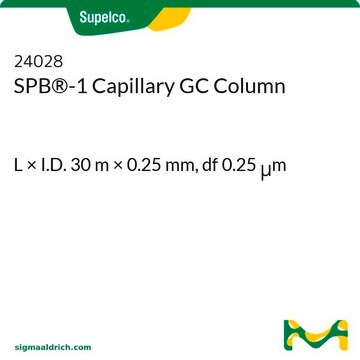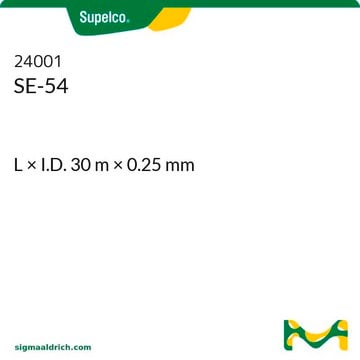25351
Columna para GC capilar SP®-5
L × I.D. 60 m × 0.53 mm, df 5.00 μm
Iniciar sesiónpara Ver la Fijación de precios por contrato y de la organización
About This Item
UNSPSC Code:
41115710
eCl@ss:
32119290
Productos recomendados
material
fused silica
Quality Level
agency
meets requirements for USP G27 and G36
parameter
-60-260 °C temperature (isothermal)
-60-280 °C temperature (programmed)
Beta value
27
df
5.00 μm
technique(s)
gas chromatography (GC): suitable
L × I.D.
60 m × 0.53 mm
matrix active group
Bonded; poly(5% diphenyl/95% dimethyl siloxane) phase
column type
capillary non-polar
¿Está buscando productos similares? Visita Guía de comparación de productos
General description
Capillary GC column is also known as open tubular column. The carrier gas flows through the central aperture and is unrestricted throughout the length of the column.
Aplicación: Esta columna no polar de uso general proporciona principalmente un orden de elución por punto de ebullición con un ligero aumento en la selectividad, en especial para los compuestos aromáticos.
Código USP: Esta columna cumple los requisitos G27 y G36 de la USP .
Fase:
Código USP: Esta columna cumple los requisitos G27 y G36 de la USP .
Fase:
- Ligada
- Poli(difenil al 5 %/dimetil siloxano al 95 %)
- ≤0,32 mm D.I., <2 μm: de -60 °C a 320 °C (isotérmica o programada)
- ≤0,32 mm D.I., ≥2 μm: de -60 °C a 300 °C (isotérmica o programada)
- ≥0,53 mm D.I., <2 μm: de -60 °C a 300 °C (isotérmica ) o 320 °C (programada)
- ≥0,53 mm D.I., ≥2 μm: de -60 °C a 260 °C (isotérmica ) o 280 °C (programada)
Application
SPB®-5 Capillary GC Column was used for speciation of the nitrogen compounds (quantitatively), which are polar and somewhat basic in nature, with chemiluminescence detection. It may be used as stationary phase for determination of nivalenol and deoxynivalenol in cereals by electron-capture gas chromatography. It may also find application in being used as stationary phase in capillary column gas chromatography for determination of sterols.
Other Notes
We offer a variety of chromatography accessories including analytical syringes
Legal Information
SPB is a registered trademark of Merck KGaA, Darmstadt, Germany
Storage Class
11 - Combustible Solids
wgk_germany
WGK 3
flash_point_f
Not applicable
flash_point_c
Not applicable
Elija entre una de las versiones más recientes:
¿Ya tiene este producto?
Encuentre la documentación para los productos que ha comprado recientemente en la Biblioteca de documentos.
Determination of nivalenol and deoxynivalenol in cereals by electron-capture gas chromatography
SCott PM
Journal - Association of Official Analytical Chemists, 889-893 (1985)
Á Kenéz et al.
Journal of dairy science, 102(12), 11718-11729 (2019-09-30)
Adipose tissue response to endocrine stimuli, such as insulin, is crucial for metabolic adaptation at the onset of lactation in dairy cows. However, the exact molecular mechanisms behind this response are not well understood. Thus, the aim of this study
J M Jurado et al.
Talanta, 106, 14-19 (2013-04-20)
4-Methylsterols and 4,4-dimethylsterols of 47 samples of subcutaneous fat from Iberian pigs reared on two different fattening systems, "Extensive" and "Intensive", have been analyzed by GC-MS and GC-FID. The lipids were extracted by melting the subcutaneous fat in a microwave
Development of a passive sampler to measure personal exposure to gaseous PAHs in community settings.
Zhihua Fan et al.
Environmental science & technology, 40(19), 6051-6057 (2006-10-21)
A sensitive, simple, and cost-effective passive sampling methodology was developed to quantify personal exposure to gaseous polycyclic aromatic hydrocarbons (PAHs). A Fan-Lioy passive PAH sampler (FL-PPS) is constructed from 320 sections of 1-cm long SPB-5 GC columns (0.75-mm i.d. and
O Suzuki et al.
Forensic science international, 46(3), 169-180 (1990-07-01)
Positive-ion electron impact (PIEI), positive-ion chemical ionization (PICI) and negative-ion chemical ionization (NICI) mass spectra of 9 carbamate pesticides are presented. In the PIEI mode, the spectra showed small molecular peaks, intense or base peaks due to M - CH3NHCO
Nuestro equipo de científicos tiene experiencia en todas las áreas de investigación: Ciencias de la vida, Ciencia de los materiales, Síntesis química, Cromatografía, Analítica y muchas otras.
Póngase en contacto con el Servicio técnico




